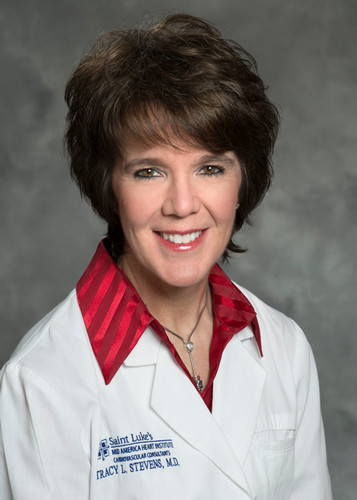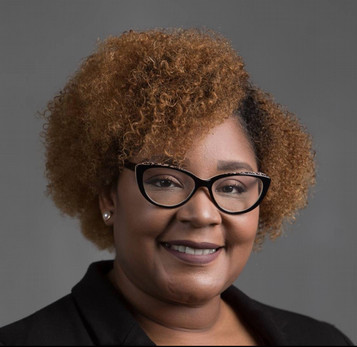For American Heart Month, we talked to cardiologist Tracy Stevens (M.D. '90), and licensed professional counselor Shantai McCray, M.A., L.P.C., about keeping our hearts feeling good, healing a broken (or damaged) heart and more.
Whether you plan to spend the holiday with your special someone or by taking part in some self-care, our two heart experts and UMKC faculty members can help make every day an opportunity to celebrate your heart, not just Valentine’s Day.

Stevens is a professor of medicine at UMKC, a cardiologist and medical director of the Muriel I. Kauffman Women’s Heart Center. She found passion for all things heart when she was working as a physical therapist at Saint Luke’s Hospital’s cardiology rehab center, and decided to attend the UMKC School of Medicine’s four-year medical program.
“I still remain so grateful for the education and experience in my four years at UMKC,” she said.
She has been a champion of women’s heart health throughout her career, and is passionate about educating people about ways to keep their hearts healthy.

McCray originally planned to attend law school, and first became a family court case manager, where she found she had a gift for compassion and understanding. Her plans for law school were still in sight, but as she started her family she continued her work in the field of mental health, substance abuse and family services.
“At some point I had figured out that this is what I was supposed to be doing,” McCray said.
After earning a master’s degree in counseling, she started a private practice and eventually became an adjunct teacher in the psychology department at UMKC in 2022.
What does the average person need to know when it comes to taking care of our heart?
Stevens: It boils down to one word and it’s “discipline.” We can prevent traditional heart attack and stroke by 95% by engaging in lifestyle strategies. It’s what we know to do, we just aren’t doing it. Eat healthy. Think of a plate, not a platter. Half the plate is vegetables, a quarter fruit, a quarter protein. Just keep it simple. Stay active. You don’t have to be a maniac about exercise, but move. Do what you like to do and make yourself do it. Maintain ideal body weight, don’t smoke, limit alcohol and avoid prolonged sitting. Sitting is the new smoking and it’s killing us.
If we do those ideal lifestyle strategies, it reduces our risk by 95%. If you just pick two, you reduce your risk by 92%.
McCray: One of the things that I think is important both personally and in my position as a helper, is first, acknowledgment. Sometimes I feel like that is the biggest part of the battle, because we live in a society where productivity is key, and we continue to move and to go and to get involved and to be engaged, and there’s not enough focus. There hasn’t been enough focus on making sure that you’re okay so you can be at your best when you’re doing all these things. Just be in acknowledgment that there’s something going on, that you’re feeling something. It’s okay to feel it. Because we’re in this rat race, we don’t always stop.
I give the example of putting my feet on the floor in the morning and asking myself, ’Where am I?’ And not physically, but, where am I? What am I feeling? What do I need to do in order to get myself to a better place?
If we acknowledge it, then we can be prepared to work through it. If we push it to the side, that’s when it starts to build up and that’s when you start to have some of the larger issues.
What signs might indicate our heart isn’t in the best shape?
Stevens: If you’re stepping on the gas and now you can’t get the gas, you should think, “could this be my heart?” Anything exertional that limits you from the waist up. We think of a heart attack as the Hollywood holding-the-chest-clenched-fist visual. We don’t do a good job of asking about chest pain. It could not be chest pain but chest pressure. It could be indigestion, shortness of breath, pain between the shoulder blades, a toothache, elbow pain, dizziness. A symptom I worry about is new overwhelming fatigue. Anything from the waist up, including fatigue, that you can’t explain, you should ask, “could this be my heart?”
McCray: You know what it feels like to feel normal. When you notice you’re feeling abnormal or something’s off, you have to pay attention to that. If you’re in practice of checking in on yourself mentally or physically, then you have a better idea of what’s going on. If you aren’t accustomed to tapping into your emotions, you might be feeling something, but not able to recognize it.
So start with the mindset that, “Yep, I have feelings. They’re normal, and I need to be able to identify those. If I can do that, then I can do something about it before getting to a point where it's out of control.”
Let’s talk broken hearts. How can someone get back to feeling good?
Stevens: It’s never too late! We want to be on these healthy habits that reduce inflammation in our body. The anti-inflammatory lifestyle is of utmost importance, and it’s never too late to adopt healthy strategies.
McCray: Healing is not linear. You have to show yourself self-compassion and be really intentional about allowing yourself to feel. It is a process of grief when you’ve lost someone and it can be really impactful. Allow it to come when it does and don’t get into your head and judge yourself. That just adds to it.
The other thing I’ll say is still being intentional about connecting with people. As tough as it is, when your heart has been broken and trust has been compromised, connection still heals. Vulnerability begins connection. So even at your most vulnerable, you need that connection. Maybe it’s with a parent or a good friend. You can also connect with nature or a pet.
How can we help the people around us take care of their hearts too?
Stevens: It’s very sensitive, especially if you’re in a culture where people prepare food a certain way (with excess sodium or unhealthy eating habits). It’s hard to change, and disagreements break out when you try to change culture. It’s empowering people to understand that these lifestyle strategies make a difference. Even if you do just two. The best way to treat a heart attack is to prevent it. Being preventative is far easier up front than being reactive to crisis and chronic disease that could have been prevented.
McCray: When you’re talking about community, it’s just about being present. We live in a productivity-driven society, and we go and go and go. So, when we’re asking those questions and checking in with one another, if we are making eye contact and being sincere, then it allows people to feel safe to open up. If we allow ourselves to stop and really be present and intentional about connecting with one another, then we can start to reduce the stigma around emotions.

